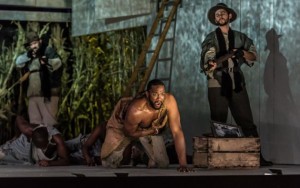
Koanga
By Frederick Delius
At the National Opera House
Review: Tom Mooney
On reflection, Koanga by Delius contains some memorable passages of music, kept in the higher gear by conductor Stephen Barlow, but the promise on the page doesn’t fully translate to the stage.
The fault would seem to be with the deficiencies in the characterisation: the realisation of Koanga and Palmyra (Norman Garrett and Nozuko Teto, both superb), fully formed, is not extended by Delius to the villains, such as Jeff Gwaltney’s Simon Perez. They don’t appear to interest the composer.
The unbalance creates a vacuum on the ever busy stage where, with better material, they would have left an impression. But this is Delius, the master of atmosphere, but not, alas, text.
Because of his interest in the Proustian ideal of recapturing a significant moment of the past, and some of Delius’s best music is inspired by euphoric memories, it is arguable that in Koanga, as in his A Village Rome and Juliet, the role of untamed nature for the composer in crafting those memories, is important.
The challenge for the Wexford production team’s take on Koanga, set in a nineteenth century Lousiana slave plantation, is what to do exactly with the Delian atmosphere, conceived while the composer was sitting on a veranda in Florida, drinking a beer (it could have been cold tea, either.)
Director Michael Gieleta segues the indigenous African elements in the opera with the burgeoning African culture in the plantation, like La Calinda, the dance sequence, and the powerful Vodoo ritual which opens Act 3.
In moments such as these, sunrise in the epilogue and the hypnotic strings in the wake of Palmyra’s death, Koanga’s potential for sweeping sensuousness emerges from the shackles imposed by Delius’s text and a stage which kept coming and going, sliding this way and that.
This was a predominately South African interpretation of what has become a reductive theme – slavery in the plantations – and the aim was not just an operatic redivivus, but imbuing the opera with Delius’s radicalism. However, what Gielata and company considered to be intrinsic, Delius the dreamer might have thought otherwise.
